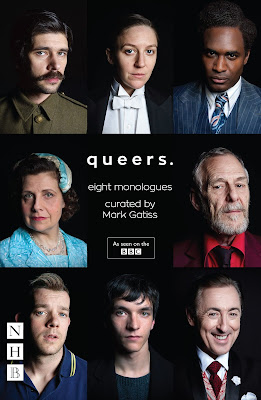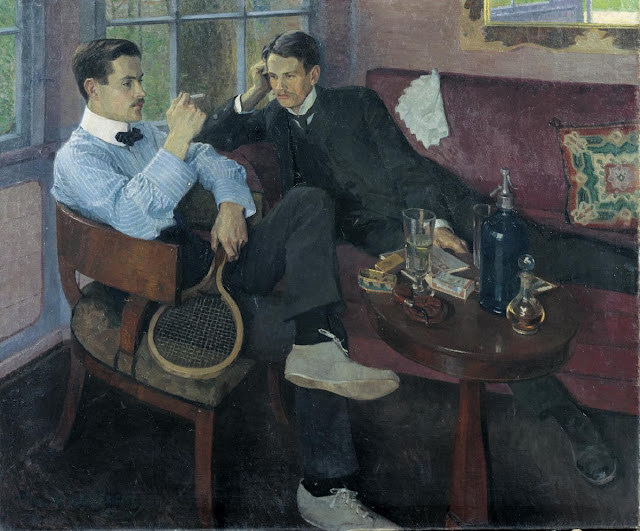 |
| Gassed (1919) John Singer Sargent (American, 1856-1925) Oil on Canvas 90½ x 240 in. Imperial War Museums, London |
Friday, June 25, 2021
Gassed by John Singer Sargent
Monday, June 21, 2021
Queers: Eight Monologues curated by Mark Gatiss
 |
| London : Nick Hern Books, 2017 |
Queers was published on the occasion of the 50th anniversary of the 1967 Sexual Offences Act which partially decriminalized sex between men in England and Wales. It would not become law in Scotland until 1980 and Northern Ireland until 1982.
Gatiss has brought together eight monologues written by himself and seven other playwrights, each taking place around a critical person or at a critical moment in history to illustrate the lives of queers in the Commonwealth over the last 100 years. Covering Oscar Wilde, the issuing of the Wolfenden Report, the Sexual Offences Act of 1967, the rise of HIV/AIDS, the 1994 lowering of the age of consent, and marriage equality. These are extraordinary snapshots, at times funny and heartbreaking. These brief yet compelling character studies show how much has changed and how little.
The monologues were first performed on the stage on 28 July 2017 and 31 July 2017 at The Old Vic, London. They were also filmed as the BBC Studios production Queers on BBC Four.
The Man on the Platform
by Mark Gatiss
Set in 1917, pairs the bittersweet train platform parting of a young soldier and his Captain with a childhood memory of Oscar Wilde on the Reading platform on his way to prison.
The Perfect Gentleman
by Jackie Clune
A gentleman in 1929 shares her stories of passing, beginning with growing up a tomboy and playing the part of the husband when she and her friend played 'wedding.'
Safest Spot in Town
by Keith Jarrett
A black man in 1941 describes the places that gay men meet in the years leading up to and during the war.
Missing Alice
by Jon Bradfield
Alice tells of being married to a gay man and the life they forged together before the issuing of the 1957 Wolfenden Report.
I Miss the War
by Matthew Baldwin
In 1967, an older gay man reminisces about the excitement of meeting men when things were less open and things like the use of Polari kept men safe from Lilly Law.
More Anger
by Brian Fillis
A young actor in 1987, laments that his only roles are of gay men dying of AIDS, while simultaneously trying to navigate his own personal life and reluctance to get tested.
A Grand Day Out
by Michael Dennis
A 17-year-old boy is among those gathered outside the House of Commons as the vote is announced for the lowering of the age of consent to 18 in 1994.
Something Borrowed
by Gareth McLean
A man remembers all of the challenges and changes in his life and in society that lead up to the possibility of this day, his wedding day.
Queers | BBC America
October 11, 2017
Wednesday, May 19, 2021
Junglinge im Gartenpavillion by Friedrich Ahlers-Hestermann
Tuesday, May 4, 2021
Maurice by E. M. Forster
 |
| New York : W. W. Norton, 1971 |
The novel quickly moves through the public school years which are defined by maintaining a facade to show adherence to the expected behavior. Maurice is aware of this in himself, but because he is equally aware of it in his classmates, he doesn't connect it directly to his sexuality.
While at Cambridge, Maurice befriends Clive Durham who talks to him about his shunning of religion and educates him on the Greek classics, in particular those which defend or describe male relationships—Plato's Symposium for instance. What should be an obviously increasing closeness between the two is not at all obvious to Maurice who is surprised when Clive suddenly professes his love.
If anything is known about the book's storyline, it is the relationship between Maurice and Alec Scudder, the game keeper at Penge, the Durham estate. The arc of the book, however is Maurice's journey toward being ready for that relationship. The confusion about one's feelings, the searching for a cure to one's feelings, the desire to be normal, are all too familiar for many future gay lives as well as the later novels that describe them.
The problems of class are on full display in Maurice. Early in the novel, it is quite clear that Maurice doesn't spare a thought for the lower class, and in some cases is actively unkind to those who inhabit it. It isn't simply that different characters are from different classes, it's how it is possible for them to live based on their position and that they have to always consider it when making choices in their lives. While Clive and Maurice are ostensibly from the same class, Clive's family is landed and have served in government, so have a very different role than Maurice's family which runs a financial firm. And, of course Alec, who works in service, has yet different possibilities for his life. Maurice and Alec's relationship, while already complicated by sexuality also has the added layer of class difference.
 |
| Abinger Edition : 5 London : André Deutsch, 1999 |
A key piece from the original 1914 manuscript that was dropped early by Forster is an epilogue that gives the reader a window into Maurice and Alec's life five years on. When Maurice's sister, Kitty, runs into him, he is working with Alec as a woodsman. The chapter, written primarily from Kitty's point of view, makes it clear that Maurice's choice has left himself and his family in disgrace and that he is no longer in contact with them. While he and Alec seem as committed to one another as ever, their life is not easy. After running into Kitty, they decide they must move on. It is interesting to see that Forster was realistic about what the future might hold for his characters, but by eliminating the epilogue he gave the reader a more uplifting ending with possibilities for Maurice and Alec.
One of the important things about reading classics of gay literature is a consideration of gay legacy and understanding the history of those that came before. Maurice is a beautiful example of acknowledging the long history of gay men and culture through the use of classics of Greek literature within the storyline, showing Clive and Maurice trying to understand themselves and their feelings by knowing their history. As well, the basis of the novel grew out of of the relationship that Forster saw between Edward Carpenter and his working-class partner George Merrill. It is the honoring of gay men who came before while passing the torch to the next generation.
Wednesday, April 21, 2021
Murder by Jared French
 |
| Murder (1942) Jared French (American, 1905-1988) Egg tempera on plaster coated panel 43.18 x 36.83 cm The Pennsylvania Academy of the Fine Arts |
Tuesday, April 6, 2021
The End of My Life by Vance Bourjaily
 |
| New York : Scribner's, 1947 |
Freak is the most 'normal guy' of the bunch and has joined the ambulance crew to do his part after failing to pass the medical exam for entry into the military. Benny, a Jewish communist understands the importance of the war and what it means for the future of the world, but particularly the future of the Jewish people and himself. Rod is a night club musician who doesn't stay in one place for long and doesn't seem to make lasting connections. Finally, Skinner Galt is the main character through whose eyes we see the action of the novel and feel the struggle of the characters.
Homosexuality is frankly acknowledged by all of the characters and it is understood that there are plenty of gay men in the military. Although it happens away from the action of the novel, Rod's relationship with one of the gay men in the ambulance outfit is offered in all its complexity. Rod isn't comfortable with what it means for him, particularly what it means for his mental health but at the same time he describes his feelings as love. So while the characters follow the gayness as illness paradigm of the time, they are also allowing for the relationship to be based on an emotional connection, not simply a physical or sexual one.
At its core, this novel is an exploration of what it means to be human. We like to think that we are all acting as individuals so what we do only affects ourselves. We don't like to acknowledge that our collective actions reflect on humanity as a whole. In Skinner's case, he doesn't get to separate himself from the consequences of war just because he drove an ambulance instead of firing a gun. As Benny points out toward the end of the novel, no human being is an exception to humanity.
Bibliographies & Ratings: Cory (IV); Garde (P, 117***); Mattachine Review (IV); Young (3259*)
Bibliographies & Ratings II: Gunn (American 37b); Levin (69); Slide (7)
Thursday, March 25, 2021
Rough Trade by Arthur Lett-Haines
Subscribe to:
Posts (Atom)

